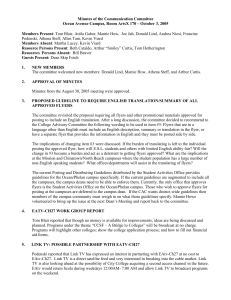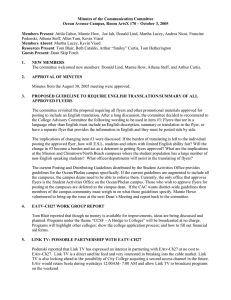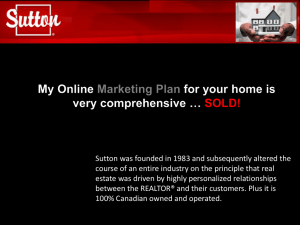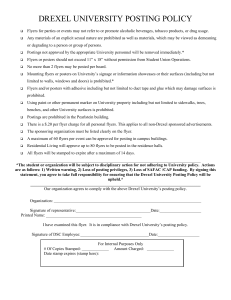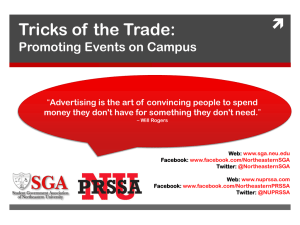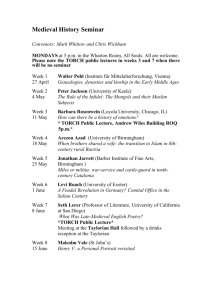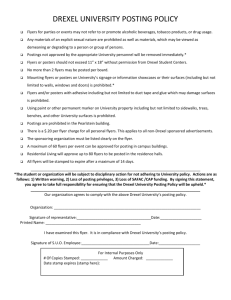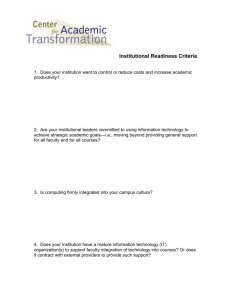So you`re having trouble promoting an event
advertisement
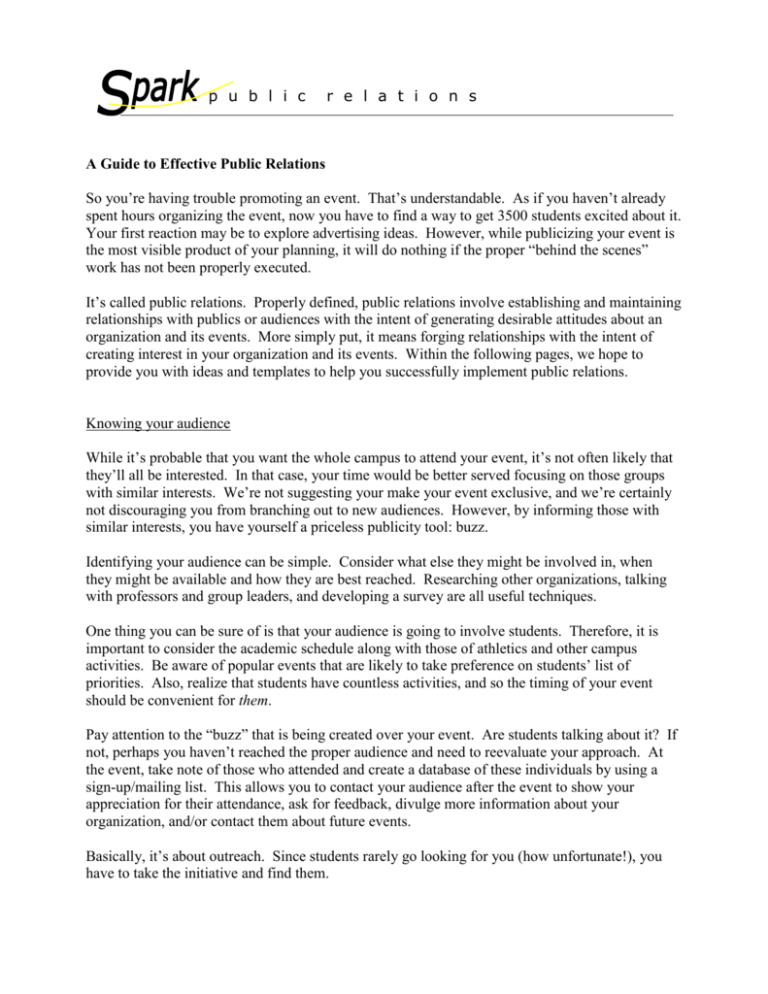
p u b l i c r e l a t i o n s A Guide to Effective Public Relations So you’re having trouble promoting an event. That’s understandable. As if you haven’t already spent hours organizing the event, now you have to find a way to get 3500 students excited about it. Your first reaction may be to explore advertising ideas. However, while publicizing your event is the most visible product of your planning, it will do nothing if the proper “behind the scenes” work has not been properly executed. It’s called public relations. Properly defined, public relations involve establishing and maintaining relationships with publics or audiences with the intent of generating desirable attitudes about an organization and its events. More simply put, it means forging relationships with the intent of creating interest in your organization and its events. Within the following pages, we hope to provide you with ideas and templates to help you successfully implement public relations. Knowing your audience While it’s probable that you want the whole campus to attend your event, it’s not often likely that they’ll all be interested. In that case, your time would be better served focusing on those groups with similar interests. We’re not suggesting your make your event exclusive, and we’re certainly not discouraging you from branching out to new audiences. However, by informing those with similar interests, you have yourself a priceless publicity tool: buzz. Identifying your audience can be simple. Consider what else they might be involved in, when they might be available and how they are best reached. Researching other organizations, talking with professors and group leaders, and developing a survey are all useful techniques. One thing you can be sure of is that your audience is going to involve students. Therefore, it is important to consider the academic schedule along with those of athletics and other campus activities. Be aware of popular events that are likely to take preference on students’ list of priorities. Also, realize that students have countless activities, and so the timing of your event should be convenient for them. Pay attention to the “buzz” that is being created over your event. Are students talking about it? If not, perhaps you haven’t reached the proper audience and need to reevaluate your approach. At the event, take note of those who attended and create a database of these individuals by using a sign-up/mailing list. This allows you to contact your audience after the event to show your appreciation for their attendance, ask for feedback, divulge more information about your organization, and/or contact them about future events. Basically, it’s about outreach. Since students rarely go looking for you (how unfortunate!), you have to take the initiative and find them. Networking Promoting your organization and its events will be much easier with the help of other groups like yours. Perhaps there are groups on campus that have similar interests. Get to know those organizations and their members. By establishing good relationships with other organizations, you will find it easier to get the word out about your events. It is also a great idea to host events with other organizations, because you will get that many more people to show. Publicizing outside the box (and off the sidewalk) The first question you should ask yourself is, “Has it been done before?” If the answer is yes, then you might consider a different approach. Now that you know who you want to reach, think about how they want to be reached. Of course there are the obvious approaches: displays on the Union’s carpet board, flyers on each department’s announcement board, and of course, the popular announcement on a sidewalk. These are fine approaches. However, if you are looking to distinguish your organization and its event, it is important to consider students’ tendency to notice these types of white noise. An approach worth taking is utilizing the resources that your audience does: form a group on Facebook, design stickers for the coffee sleeves at Grinder’s, make a website that can be placed on the university’s index, or ask to speak at events like 707 Lounge, Chapel break, or Greekorganization gatherings. Also, if you know faculty members who might be sympathetic to your cause, ask them to announce your event in their classes. Lastly, if you think you have the energy, take an interactive approach and promote your event with a grassroots campaign. Instead of printing off and hanging fifty full-page flyers, print off two hundred ¼-page flyers and hand them out personally. This doesn’t mean leaving stacks of flyers on tables. Not only is this wasteful, it is incredibly impersonal. When students receive a flyer from an individual, the promotion feels much more like an invite, and wouldn’t you rather go to an event that you were invited to over an event that you simply heard about? You might also consider setting up a table in a high-traffic area and running a promotion. The give-away can be as simple as writing utensils, food, or chip clips. The objective is to get those passing by to stop and notice your organization and its event. Of course the promotion shouldn’t be completely meaningless. The impression you leave should be influential, not awkward. Finally, we’re all aware of our campus’ mainstream media such as WVUR or The Torch. Reserving space in either of these mediums is worthwhile, but even better is securing an interview. Ask to speak shortly about your event on WVUR or invite a journalist from the Torch to your event so that they can review it in an upcoming publication. Establishing a time table Events can get away form you very quickly if you’re not organized from the start. Many of your plans will have deadlines, and each task will inevitably affect others. That is why it is important to create a timetable before promoting your event. Establish goals for yourself and find out when you need to complete tasks by (i.e. placing an article in the Torch, getting approval, etc.). As your promotional campaign unfolds, you may have to augment your timetable. Evaluating your event After the event, the most beneficial thing you can do is to perform an evaluation. No event ever goes perfectly to plan. There is a good chance that during the process, you realized that something could have been done differently. Be sure to make note of everything you notice before, during and after your event. Then, go back and discuss each point in detail and find ways to improve. Even if your event went smoothly, it is critical that you discuss your organization’s tactics; otherwise people will eventually realize that progress is not being made. Some specific ideas for assessing your event include the following: Dissect the event by processes (planning, scheduling, promoting, etc) Find out which mediums worked best for accessing your audience. Poll your audience. Making a short survey and asking participants to fill it out before leaving is an easy way to gain a new perspective. Pay special attention to the reaction of those that did not attend your event. Why didn’t they attend? What are they hearing about it afterwards? Would they go next time? Look at the success rate of similar organizations. How do you compare? What did you do differently? What can be done differently? Selling yourself It is always important to keep others aware of what it is you do. If you’re not going to be having any events for a period of time, take the opportunity to inform people about yourself. For example, set up a table in the union and give away something cheap and give people a brochure or flyer containing information about the organization. Getting an event promoted is hard enough, but it is impossible when nobody knows who you are.
